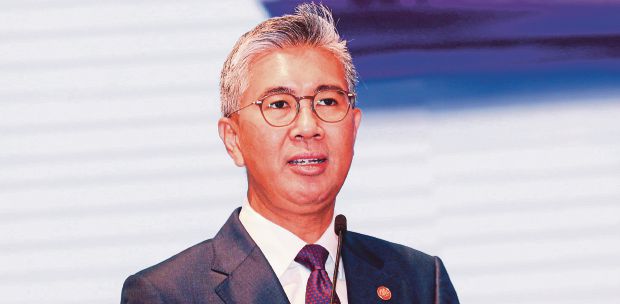“I HOLD firmly to the concept that the government’s main function is to advance the betterment of the rakyat. Hence, the decision to implement Goods and Services Tax (GST) was never taken lightly.
In implementing GST, the government has provided for certain goods and services to be either exempted or zero-rated. Both categories of goods and services are present in the broad and wide range of the various industries within our economy.
Of course, as you are already aware, all products and services for export sales are also zero-rated.
Our GST rate of six per cent is low. In fact, it is one of the lowest there is internationally. Of more than 160 countries that has GST or Value Added Tax, only five has a rate of less than six per cent.
Furthermore, there are many other countries — of which many have lower gross domestic product (GDP) per capita than ours, such as Burundi with a GDP per capita of US$250 (RM797.5); Mali with a GDP per capita of US$610 and Bangladesh with a GDP per capita of US$680 — that impose GST rates of higher than 10 per cent.
Certainly, over the next few years, revenue from the GST will increase steadily — bringing us additional revenue as the economy expands towards the year 2020 when we achieve our ambition to be a high-income economy.
We must bear in mind that achieving the ambition is not the end of our journey, it will be the beginning of a new journey to compete and and rise higher among the high-income economies.
The primary reason why we need this revenue is that we want to reduce the Treasury’s dependence of direct taxes, and that includes personal and corporate income taxes.
We have already begun the process, whereby personal and corporate income taxes were lowered gradually over the years, from 30 per cent and 40 per cent, respectively, to 26 per cent and 25 per cent. While for small and medium enterprises (SMEs), it was lowered to 20 per cent.
The government believes that with less direct tax burden, there will be greater investment and even consumption within our domestic economy.
The strategic impact would be that Malaysia, in percentage terms, will be less dependent on the external sector, on exports.
In addition, GST will give the government an historic opportunity to simplify our tax system. From two different taxes and rates to just one rate, encouraging compliance and reduces both administrative and business costs.
Our private sector is a critical contributor to the growth of our economy. It is essential that an efficient tax regime is provided for the private sector. An unwieldy tax regime is expensive to manage and costly to administer.
The ultimate beneficiary of the additional revenue that we will be getting from the GST will be spent for the benefit of all Malaysians.
As a developed nation, the government will be required to invest more and more in providing the amenities and facilities that commensurate our standing as a high-income country.
These would include the provision of higher-quality healthcare and education, better infrastructure with the development of basic roads and bridges in the deepest rural areas so long deprived of development opportunities, while upgrading existing facilities to world-class standards in the urban areas.
The keyword that will underscore our future development policy is quality. There will be less emphasis on quantity and a shift to quality and I am sure everyone in this room knows, quality does not come cheap.
While the definition of a developed nation is measured purely in economic terms, our Prime Minister Datuk Seri Najib Razak realises that we need to build the nation’s software.
As such, we will selectively upgrade our existing hardware, and the hardware that we will choose to upgrade will be the hardware that gives the highest impact in its outcome.
I can tell you that one of the things that our prime minister is passionate about is the raising of the quality of education for this country. We have built enough universities. We have built enough number of colleges.
For the future, we want to raise the quality of the education across the public education system so as to serve ultimately as an effective provider of talent for the building of a truly developed country.
I can tell you that one of the things that our Prime Minister is passionate about is the raising of the quality of education for this country.
We have built enough universities. We have built enough number of colleges. For the future, we want to raise the quality of the education across the public education system so as to serve ultimately as an effective provider of talent for the building of a truly developed country.
In addition, we also want to upgrade the quality of our delivery systems, we want to upgrade the level of standards that we all apply to, for example, the management of our environment, the management of our human resources and our natural resources. All this equates to a mammoth effort and we need the support and buy-in from all relevant sections of our society. I am sure we are aware, the future of our country rest on all Malaysians.
Our Government will further intensify its efforts to promote the incorporation of higher value into our economy’s exports, especially exports from our manufacturing sector. By incorporating greater value to our manufactured goods, we can obtain higher prices to our exports, simultaneously edging our GDP higher.
One of the easiest way to add value to our goods is to incorporate the element of design into our products – industrial design amplifies value and consequently provide justification for higher sale prices in our export markets.
This, of course, leads to the question of how the Government can develop and promote the adoption of industrial design, not only in our institutions of higher learning but also at the industry level. To do this requires money. Now, if we are to upgrade this across our economy – how do we do that?
There is one fiscal element which not many people realise. To encourage the development of anything, the Treasury would almost always introduce tax incentives, usually in the form of tax exemptions, tax holidays or even outright grants. Each of these incentive cost money.
For every Ringgit that the Treasury exempts represents a Ringgit spent. Tax incentives do not incur immediate cash outlay but at the end, it costs the Treasury all the same.
Without money, without the additional revenue, we would not have the sufficient allocations to educate members of our economy sectors to scale up through the value chain. The global market is getting increasingly competitive. We cannot compete on the basis of cost alone.
The singular end objective of all these combined efforts is to provide the necessary ecosystem for all Malaysians a better quality of life – a quality of life that would give us a longer life, a happier life, a more productive life. This is what is envisioned by our Prime Minister.




